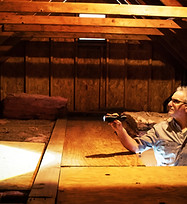

Elite Training Since 2008
Quality Inspections Since 2007
About HII Elite Training
Online Learning
Now, students can join our classes live, via video, and have the same interactive and education experience. Get elite HII training without travel, and in a safe and mask free environment - your own home or office located anywhere in the world!

Proprietary Material
Only HII has our expansive test preparation and study modules with an unparalleled breadth and depth of information. Students who finished our program pass the national exam.

State Approved
Yes! The Home Inspection Institute is a state approved private vocational school. In fact, we are one of the original and longest running schools in the state. And, we are the highest rated by students!
Please note, we do not offer college credit courses.

Curriculum
We cover every major house system, component defects, implications, and how to find them with hundreds of technical and detailed illustrations over 140 hours of interactive instruction.

Instruction & Fieldwork
Engage with discussions, lectures and slide shows, real life examples, skill development tests, case studies, individual and group projects, practice exercises and more! And, you practice real inspections with our staff.

Still want more info?
Here is our detailed curriculum.
Interior & Insulation Inspection THII-101
Focus is on the inspection of thermal insulation, Moisture Management techniques & Issues, vapor retardants and ventilation systems, as well as the interior elements of residential dwellings such as walls, ceilings, floors, basements, doors, windows, interior stairs/railings, installed counter-tops and cabinets, and garage doors/door operators.
Roofing Inspection THII-102
The emphasis in Roofing Inspection is on typical defects of the various types of roof coverings, drainage systems, flashings, skylights, chimneys, and other roof penetrations. Students apply their classroom knowledge of roofing to inspections that focus on system performance, safety concerns, and compliance with existing codes and standards.
Exterior Inspection THII-103
Exterior Inspection covers retaining walls, grounds, window wells, lot grading, driveways, patios, walkways, decks, balconies, stoops and steps, porches, railings, wall cladding, flashing trim, eaves, soffits, fascia, as well as exterior doors and windows. Students learn to describe the exterior wall covering and inspect all aspects of the exterior named above.
Structural Inspection THII-104
Structure Inspection focuses on the following structural components of a residential dwelling: Foundations, and footings, floors, walls and roof ceiling structures. Students learn to apply knowledge, of structures to inspections that focus on system performance, safety concerns, and compliance with good construction practices.
Heating I Inspection THII-105
Heating Inspection I covers installed heating systems (Gas and Oil Furnaces, and Hot Water Boilers).
Emphasis is on the Inspector’s ability to identify the source, material type, condition, and safety concerns, as well as to inspect the heating equipment.
Heating Inspection II THII-106
Heating Inspection II covers vent systems, flues, and chimneys, as well as fireplaces, other wood heating appliances, steam and electric heating systems. Students apply knowledge of these systems to the role of the home inspector.
Air Conditioning & Heat Pumps Inspection THII-107
Emphasis in Air Conditioning and Heat Pumps Inspection is on cooling systems and heat pumps. Students learn to identify typical defects and apply correct inspection techniques.
Plumbing Inspection THII-108
Plumbing Inspection prepares students to inspect, in a residential dwelling, the interior water supply and distribution systems (including fixtures and faucets), as well as water heating equipment and drain/vent/waste systems and their related fixtures.
Electrical Inspection THII-109
Electrical Inspection prepares students to inspect the performance of the following components of Electrical Systems within Residential Buildings: Services Drops, Grounding Systems, Service Panels, Wiring Systems, Devices, and Fixtures.
Communications & Professional Practices THII-110
The home inspector is required, both verbally and in writing, to describe the inspection process and communicate inspection findings to the client. It is imperative that the home inspector be able to communicate clearly and effectively to ensure understanding of an inspection, once conducted. Students in this subject develop their oral and written communication skills, learn to develop the professional communication skills needed to be a Professional Home Inspector.
Home Inspection Field Mentoring Certification Program THII-FM
The home inspection field mentoring certification program fulfills the 40 hour field mentoring training required for licensure as a home inspector in New Jersey as governed by the NJ Department of Consumer Affair’s Home Inspection Advisory Committee. The student/applicant accompanies a licensed NJ Home Inspector on 40+ hours (approximately 16 inspections) of real-world home inspections.


